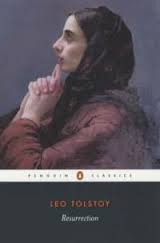Resurrection by Count Leo Tolstoy

Federation Square book sale 2016. Image courtesy of Nick-D.
When in Melbourne, we of TVC attend the Saturday morning book sale at Federation Square. There, in the dank central court, eccentric sellers of very good used books sell classics and books which have just appeared in the shops. Amid these booksellers who know their stuff and their customers, lurk a few grim self-published authors who sell nothing and look on sadly while pretending to work on their next badly-illustrated but politically-correct slim volume for children.
One of the sellers of very good books is a handsome, red-haired Russian woman of whom we at TVC are terrified. (Let us call this stern and tenacious woman Svetlana). Touch one of Svetlana’s trove of books about Mother Russia and Svetlana decides that you will buy it. You will, too. In just this manner a few years ago, Svetlana frightened me into buying Resurrection, the fin de siècle novel which led to Tolstoy’s ex communication in 1901. Finally guilted into it by the praying girl on the cover and the spectre of the flame-haired Svetlana, I dusted it off this year and read it.
The awkwardly named Nekhlyudov (I would have asked Svetlana how to pronounce it if I hadn’t been running away) is a wealthy prince who wants to give his land, or some of it, to the peasants, or rent it to them but pay the money back to them, or something. The stolid, down-trodden former serfs on his estates are completely confused by this, as are we. Of course, he only means the male serfs – who are you kidding? Neckhollyoodov seduces his aunt’s ward, the pure and appealing but squinting Katusha Maslova, who in the way of nineteenth century novels must and does, now go to the bad. So does Nikkyeldov. Both lead debauched lives, he in the army, she in a brothel. When Nekkyylyuduv recognises her as the defendant in a murder trial in which he leads the jury, he resolves to follow Maslova wherever she may go and marry her, if necessary. Maslova barely remembers Nek-whatsisname and thinks, as we do, that he is deranged, inconsistent and absolutely not to be trusted. Nekeklydovvly’s society fiancé is disposed of with nary a thought on anybody’s side. Finally something happens and they set off for Siberia. The best part of the novel describes the gathering of the convicts and their gruelling journey.
This is Tolstoy so the prose is numinous and deft. Nekhlyudov is finely wrought – Mother Russia herself in her most maddeningly vacillating, idealistic, ranting lunacy. Maslova is Mother Russia herself at her most wily, drunken, calculating and indolent.
But the internal machinations of Nekhlyudov’s search for – ultimately – God and the thin storyline, peppered with the convenient appearances of “types” to whom Nekhlyudov can explain, or have explained, his latest theories, are a snore.
As a sampler of Tolstoy’s polemic against the legal, religious and caste systems in Russia, Resurrection is a good primer. If you can read the passages in Anna Karenina dealing with Levin’s meditations without snoring, then this is the book for you.
Leave a comment...
While your email address is required to post a comment, it will NOT be published.



2 Comments